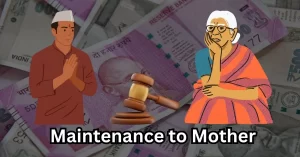In a legal twist, the Karnataka High Court has reopened a case involving maintenance to a mother. This case has garnered significant attention due to its intricate details and shifting evidence.
The case involves a legal battle between a mother and a son. The Judge of the Additional Family Court, Mysore, on June 12, 2014, had allowed mother’s petition under Section 125 of the Criminal Procedure Code (Cr.P.C.) and asked the son to pay ₹3,000 per moth to the mother. Dissatisfied with the Family Court order, the son filed an appeal before the Karnataka High Court under Section 19(4) of the Family Court Act.
The mother, approximately 54 years old, alleged that she was a legally wedded wife and had three children with her husband, one son, and two daughters. Following her husband’s demise, her son had allegedly deserted her and was not providing financial support, rendering her unable to sustain herself. To remedy her situation, she approached the Family Court, seeking maintenance.
However, the son contested these claims. He argued that his mother had abandoned their family during his father’s lifetime and was living separately. He further claimed that she possessed substantial resources, including properties registered in her name, from which she earned an income sufficient for her sustenance. He sought the dismissal of her petition.
The Family Court deliberated the matter and framed crucial issues. It considered whether the mother had been neglected without valid cause, whether she was entitled to maintenance, and, if so, at what rate.
The mother presented herself as the key witness and submitted various documents as evidence. In contrast, the son testified in his defense and presented his set of documents.
Ultimately, the Family Court ruled in favor of the mother, ordering her son to pay Rs. 3,000 per month as maintenance.
However, the case took a new turn when the son appealed the decision to the Karnataka High Court and produced some documents showing that the mother owns a house property. These documents were not available with the son earlier so they could not be produced before the Family court.
In light of these documents, the Karnataka High Court decided to reopen the case. The court acknowledged the new documents revealing that residential buildings had been constructed on the properties registered in mother’s name, and some portions were rented out.
In light of these developments, the court believed that a fresh examination of the evidence was necessary. Consequently, the case was sent back to the Family Court for a comprehensive reevaluation. Both parties were given the opportunity to present additional evidence and produce further documentation.

